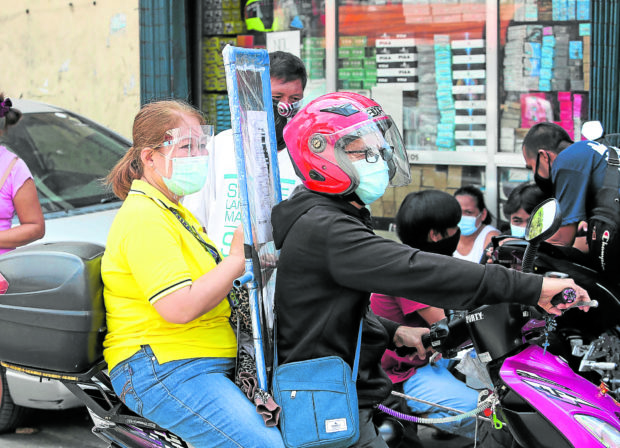More than 22,000 motorcycles flagged down for pillion riding violations

BARRIER PROBLEMS A couple rides a motorcycle equipped with a handheld makeshift barrier in accordance with regulations, which officials said would prevent them from infecting each other with the coronavirus. —MARIANNE BERMUDEZ
MANILA, Philippines — The police had flagged down more than 22,000 motorcycles carrying couples who violated the policy on pillion riding less than two weeks after the authorities allowed spouses to ride together as a solution to the transportation problem following the easing of the COVID-19 lockdown.
Following appeals from motorcycle owners, the government allowed husbands and wives and common-law spouses to travel together on motorcycles, which must have a barrier separating the driver from his passenger. Authorities said this would help stop the spread of the coronavirus from one to the other.
Figures released by the Joint Task Force COVID Shield chief, Police Lt. Gen. Guillermo Eleazar, on Tuesday showed that 22,441 motorcycles had been accosted nationwide since the ban on pillion riding was lifted on July 10.
Of the total, Eleazar said police flagged down 9,649 without barriers. Another 1,283 had barriers but the pillons were not spouses or partners of the driver.
He said 11,509 were accosted because the motorcycles did not have barriers even though they carried couples.
Article continues after this advertisementEleazar said all of the violators were warned and were advised to comply with the requirement by the July 26 deadline.
Article continues after this advertisementContraption ‘safe’
Despite criticisms that the two approved protoype barriers were causing accidents, Eleazar said these were “safe.”
“These two approved designs, the Bohol prototype and the Angkas design, underwent a thorough study, which includes the concept of aerodynamics, and were also tested for quality safety standards. Before approving them, our NTF Against COVID-19 made sure that the barriers are not only effective to shield both the riders from coronavirus infection but also safe from road accidents,” he said.
According to him, motorcycle accidents that are blamed on barriers could be “a result of faulty installation or substandard materials used.”
“The two approved designs have specifications that conformed to the quality standard for safety of the riders,” he said.
After the July 26 deadine, Eleazar said the police would be strictly enforcing the pillion policy.
He said motorcycle riders could adopt the Bohol prototype where the barrier is installed between the driver and the pillion or the Angkas design where the barrier is worn by the driver like a backpack.
“The government has already provided the specifications and all they need is to comply,” he said.
Both the Bohol and Angkas designs are about 46 centimeters wide and 85-cm tall, measuring from the seat, or higher than the head of the pillion, and made entirely of hard plastic or transparent plastic fitted on a frame.
Expanded requests
Currently, only married couples and partners living in the same house are allowed for pillion riding.
“We understand the expanded requests to include family members but we assure the public that the NTF Against COVID Shield has taken note of their requests and this will surely be granted in the coming days especially once the community quarantine is lifted,” Eleazar said.
There are around 7.2 million registered motorcycles nationwide.
In remote areas in the country, they are the only motorized vehicles that villagers rely on for transporting people and goods. They are reconfigured to carry more than two people and heavy loads and variously called “habal-habal” or “skylab.”
For more news about the novel coronavirus click here.
What you need to know about Coronavirus.
For more information on COVID-19, call the DOH Hotline: (02) 86517800 local 1149/1150.
The Inquirer Foundation supports our healthcare frontliners and is still accepting cash donations to be deposited at Banco de Oro (BDO) current account #007960018860 or donate through PayMaya using this link.